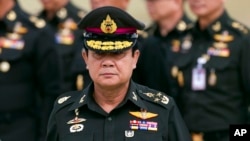Thailand's military-led government is planning to hold talks with separatist groups in Southern Thailand to try to end a decade of violence that has claimed more than 6,000 lives. Analysts remain cautious about potential progress after previous talks stalled.
Prime Minister Prayuth Chan-ocha's government is setting up new security arrangements in the troubled southern border provinces, with the military controlling both the local security officials and the negotiations with rebels.
Talks begun in February last year under the civilian government of Prime Minister Yingluck Shinawatra stalled in October after failing to make substantive progress.
Analysts say during the Yingluck government, divisions opened up between civilian administrators and the military, undermining efforts to curb violent attacks.
The Thai military has set up an executive committee and a peace dialogue commission for peace talks to proceed. An executive policy committee is to be chaired by Prime Minister Prayuth. The government, under the plan for the south, is also expected to appoint a new chief negotiator.
General Prayuth says more insurgent groups need to get involved in the talks that were initially led by the separatist BRN or National Revolutionary Front, and also have the official backing of neighboring Malaysia.
Panitan Wattanayagorn, a defense analyst at Chulalongkorn University, says moves to a more unified security and negotiating structure are welcomed.
"You have a more unified structure for the first time from the top down to the bottom. So these are very, very much refreshing on one hand but the real success should be on the ground, whether or not the implementation from the top can be successful on the ground."
Greater role for women
Angkhana Neelapaijit, a rights advocate, says civil society and human rights groups are calling for a greater role in the talks for women, often hard hit by the violence and conflict and groups outside the military.
"One thing civil society is not talking seriously about is how we can encourage the women to engage in the peace process and to make recommendations because men talk about power sharing, they talk about the administration but when women talk they talk about the quality of life, the health services, the social welfare," Angkhana said.
The most recent deadly attack came in late July when a car bomb exploded near a hotel in the southern town of Betong, in Yala province near the Malaysian border, leaving at least three dead and over 30 injured.
More than 6,000 people - both Buddhist and Muslim -- have perished in the violence that remerged in 2004 after a decade as violence had subsided.
Officers from the Internal Security Operations Command (ISOC) say the Thai military is looking to gain insights from other regional insurgencies, such as Aceh in Indonesia, Mindinao in the Philippines and Northern Ireland.
Autonomy
In both Indonesia's Aceh and in the Philippines region of Mindinao the respective governments eventually agreed to a degree of autonomy.
So far the Thai Army has resisted any calls for autonomy, instead calling for an end to violence before substantive talks can begin.
But Chulalongkorn University defense analyst Panitan, says the military may have to accept a political solution, including a degree of autonomy, if the talks backed by General Prayuth are going to succeed.
"It remains to be seen if they could come up with a winning political solution or winning political strategy as they have in the past. Eventually after maybe three to six months tackling the economic problem [Prayuth] may have to come around and really work on the south together with a political solution," Panitan said.
In the 1970s and 1980s, Thai military leaders, along with support from Malaysia, succeeded in ending a prolonged period of insurgent violence through a combination of talks and offers of amnesty to insurgent fighters.










